
3 RVers Making the Most of a Difficult Year
3 RVers Making the Most of a Difficult Year
The pandemic gave these couples some wild campfire stories to share.
By: Heath & Alyssa Padgett
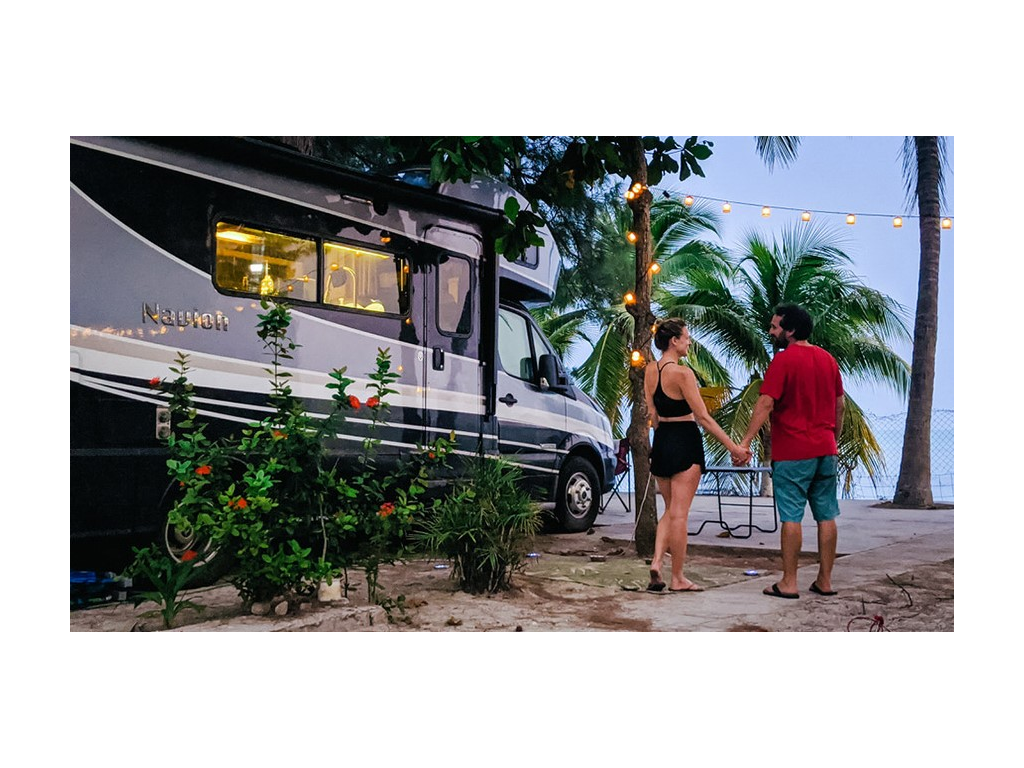
The campgrounds are shut down.
Public lands are closed.
We’re hundreds of miles from home.
In March, full-time RVers faced a mountain of challenges.
In our six years of traveling, this year was the first time we ever felt rootless. Traveling wasn’t banned, but it was strongly discouraged. We ended up in a small RV park in Alabama worrying about if we would even be able to cross state lines to return to our families. And when we arrived, if there would even be a place for us to park.
But our worries were small potatoes compared to our friends.
Some RVers have had their lives turned upside down by the pandemic — even getting stuck in foreign countries and being ordered home by the police or the actual cities themselves.
Today we wanted to share with you a few stories of fellow RVers who narrowly escaped international border closures, experienced kindness from strangers during tough times, adopted a new dog, and ultimately made the most of a difficult year.
Stuck in Mexico
Katelyn and Howard Newstate were thousands of miles from the U.S. border touring a chocolate farm in the jungles of Mexico the day the U.S./Mexico border officially closed.
Which as far as being stuck in a foreign country goes, a chocolate farm sounds like one of the best places you can be.
Visas in hand, the Newstates planned on spending six months in Mexico before the pandemic changed everything. They ended up spending five months in the country, with three of those spent in quarantine.
“Once it was apparent that shutdowns and quarantines were happening in both states, we weighed the options of staying or making the long trek back. Given how far we had already traveled in the country (and how long it would take us to reach the U.S.) combined with the news of how difficult it was to find camping back in the states, we made the collective decision with our travel companions to ride it out there,” the couple said.
Once Mexico issued a national stay-at-home order, they parked the RV and only left to visit the market.
But it isn’t too bad being stuck in one place when your campsite looks like this:
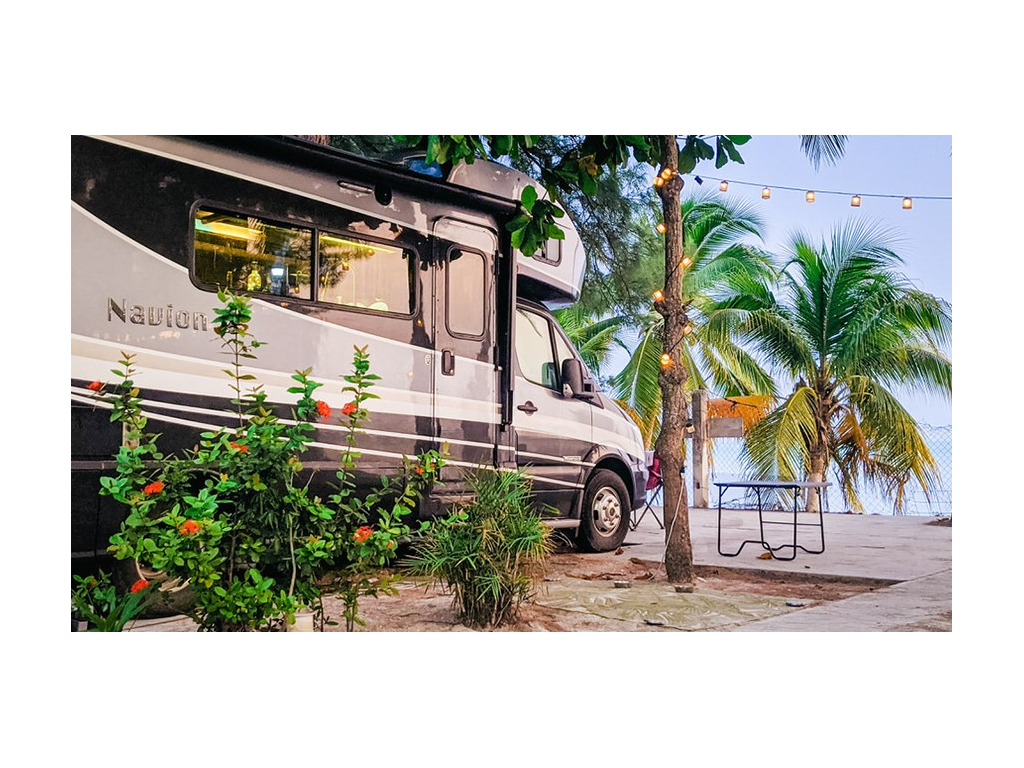
“At first, it definitely felt like vacation – partly because we all assumed it would be for maybe a month. But once four weeks turned to eight and so on, I think we all had moments of feeling isolated. The beach was closed down by the health authorities for a large portion of the time we were quarantined, and the state we were in even banned the sale of alcohol!”
When the beaches did open again, the Newstates spent their mornings enjoying the water and the sand. Which is where they adopted their newest friend, Scout.

“Meeting and ultimately rescuing Scout was definitely the highlight,” Katelyn said of their time in quarantine. Training and caring for the stray dog gave them something good to focus on together. “She’s such a fun addition to our adventure family!”
In addition to growing their traveling family, the couple made new friends during quarantine. They and one other RV couple had the beachfront RV park to themselves. The owner, Thelma, and the guests all were able to help each other in different ways and keep each other sane.
And in spite of spending three months parked there, the Newstates already can’t wait to go back.
(Almost) Kicked out of New Mexico
One of the biggest fears that many RVers had during COVID nearly came true for Paul and Heather Ryan: being kicked out of their campground with nowhere to go.
Shortly after arriving at a park in Deming, NM, Paul and Heather received a message that they would be required to leave. The county would not allow any short-term stays in the area and this was inclusive of RVers. The main problem for full-time RVers was that many counties were beginning to implement similar restrictions, leaving full-timers with nowhere to go.
However, before the restriction was enforced, Escapees stepped up to the plate and went to bat for the RVers staying in their campground. They spoke with the county and lobbied on behalf of the full-time RVers in their campground. They convinced local authorities to keep the park open to all of the RVers already staying at the park, giving full-timers a place to stay during quarantine.
Being in one place gave the Ryans a chance to spend more time working on their businesses, both of which have doubled over the course of this year. Not only this, but Paul shared that the forced pause also pushed them to “run and exercise more than we had in the past three years altogether.”
After restrictions were lifted, the Ryans escaped to national forest land where they were able to continue traveling with the OG version of social distancing.
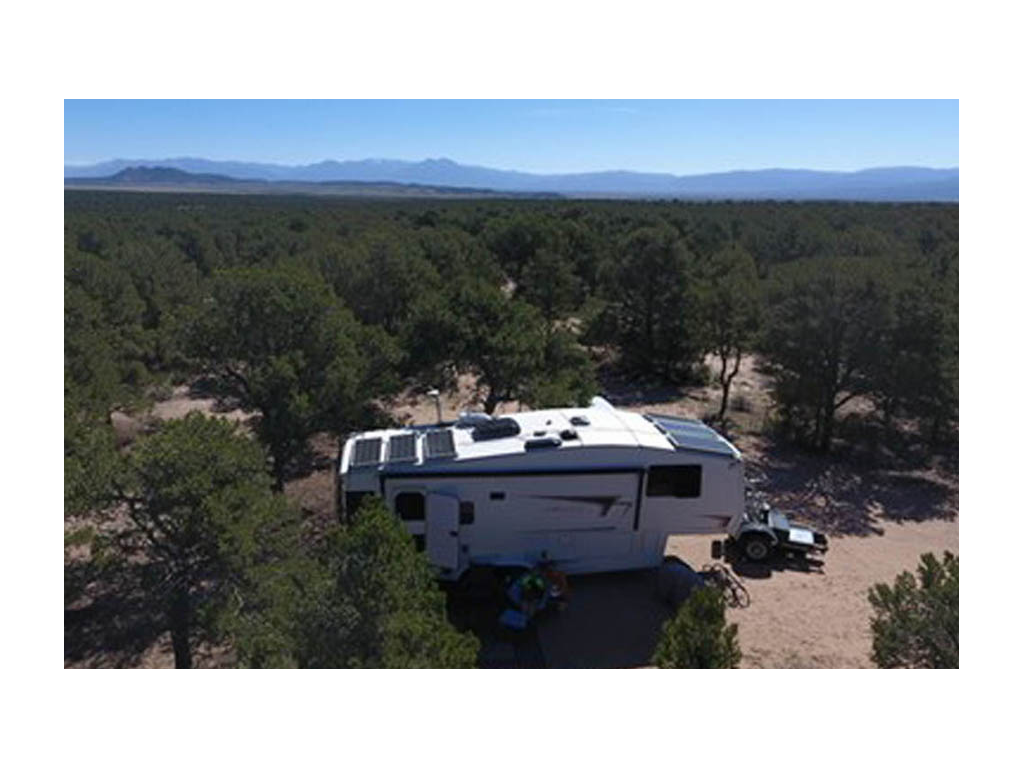
The 9,000-Mile Journey Home
John and Peter from the RVers TV show were on-location filming and campervanning across New Zealand when COVID-19 started hitting the news circuits. It was early in the year and no one was worried about it yet. So, they spent a few weeks exploring the country, freedom camping on beaches, and keeping one eye on the increasingly worrisome news.
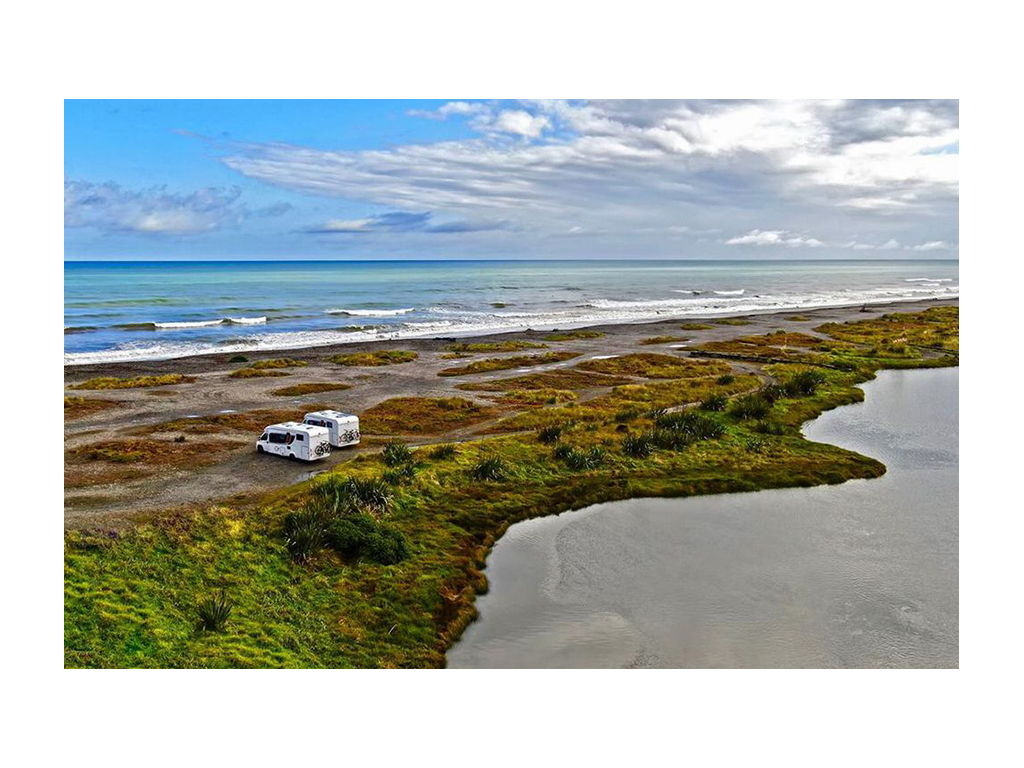
But then the Fantasy RV Tour they planned to film was canceled.
COVID was declared a pandemic.
And they found themselves at the southernmost tip of the southern island, as far away as they could possibly be from the international airport in Auckland.
At first, John and Peter saw this as good news. “We were already social distancing in the RVs,” they said. Maybe the travel bans would mean they would have the national parks all to themselves for a few weeks!
But the very next day, reality came crashing down and a shelter-in-place order came into effect. They had to make plans fast or risk being stuck in New Zealand indefinitely. Fortunately, John and Peter were traveling with their friends and fellow co-hosts, Tom and Cait. This, they explained, was a huge blessing and source of comfort to not be alone during such a frightening and confusing ordeal.
Together, the group made a plan to make their way back to the North Island and the capital city of Auckland where they could board a direct flight to the U.S.
Unlike America, New Zealand went into full lockdown mode and enacted very strict rules. You could not be on the roads unless you were driving to the hospital, the grocery store, the pharmacy, or the airport. To drive to the airport, you needed to have a ticket in hand in case you were pulled over by the police.
The restrictions went into effect almost immediately, giving the group a small window of time to drive more than 1,000 miles to Picton, the small port town where you ferry between the islands. To make it even more complicated, the ferry service was closing the next day to all non-essential travel.
“So, we had 24 hours to find a way to get to the North Island,” Peter said. “And they were sold out.” With every boat full, John and Peter drove nonstop and camped in the small port town hoping they could make it to the North Island. Otherwise they would be stuck on the South Island for at least a month.
During this time, John and Peter were receiving a lot of messages from locals informing them of the limitations and restrictions. However, the messages not only offered advice on where to go, but also consisted of random strangers offering them a place to stay if they needed one. This gave the group peace of mind that if they didn’t make it home, the Kiwi community would welcome them in their homes and driveways.
New Zealand is a major tourist destination (we’ve also spent months RVing in New Zealand!) and because there were so many non-nationals in the country struggling to make it to the airport, the ferry service opened up additional boats last minute to make sure everyone could get back home.
At the time, they shared: “With only 24 hours to go before a mandatory nationwide shutdown takes place here in New Zealand, we managed to get tickets for ourselves and Tom & Cait to get back to the North Island on one of the final Interislander Ferries before a MINIMUM MONTH-LONG SHUTDOWN OF ALL FERRY SERVICE AND DOMESTIC FLIGHTS!”
As soon as they landed on the North Island, John and Peter kept driving north toward Auckland for the third straight day in a row. They drove until midnight as they made their way to the city and true to the shutdown rules, there was no one else on the road.
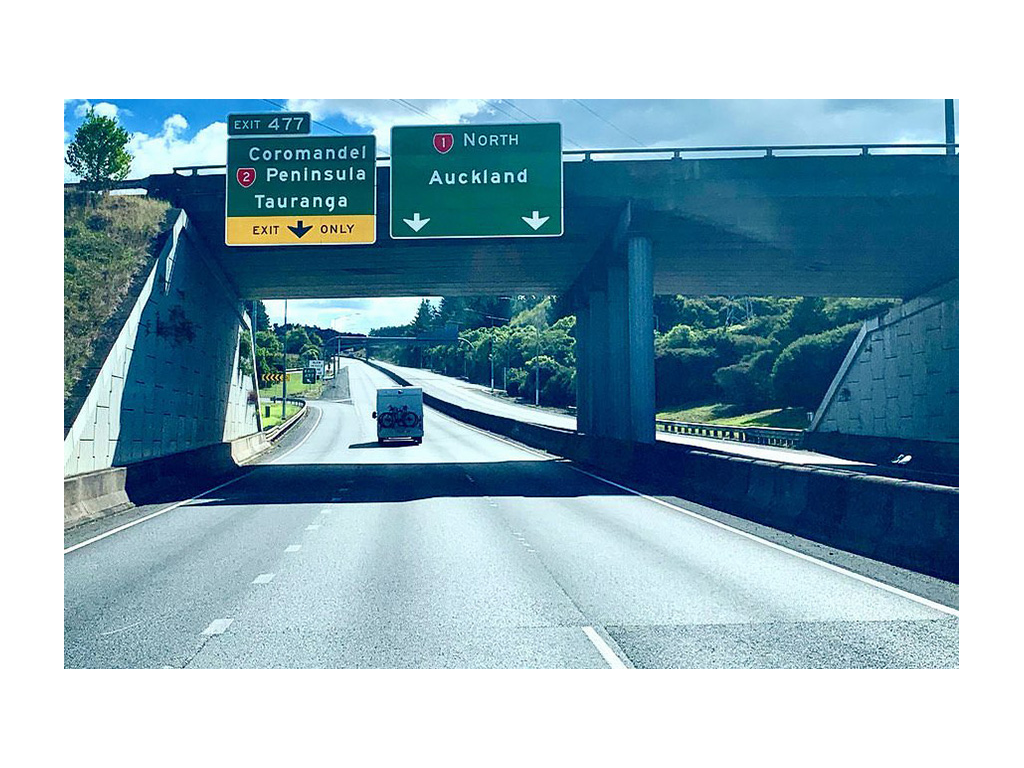
Finally, after three straight days of driving, trying to make travel plans, and stressing over being stuck 9,000 miles away from their families, they arrived in Auckland ready to fly home.
And their flights were canceled.
It was one blow after another.
“If we have to be stationary, and isolated from everyone else, we could have done a lot worse than being with great friends who stop by to see if we want to have lunch, and then grill it for us,” John and Peter said of their self-isolation while waiting for a flight home. “We feel so lucky to have Tom & Cait to share the challenges of being so far from home and unable to get back.”
For five days, the group camped outside of Auckland hoping for a flight to open up and take them back home.
Well, almost home.
Eventually, the group arrived in LAX and then boarded another plane to Vegas where their Newmar motorhome was in storage. NIRVC pulled their motorhome out of storage, plugged it in, and set it up in their parking lot so John and Peter could go right into their home without interacting with any employees.
John and Peter, if you’ve watched their TV show or their YouTube channel, have been full-time RVing for well over a decade. And a few years ago, they officially became dual citizens of the U.S. and Canada. They own a campsite up in British Columbia where they spend their summers.
So, although they were back in their home on wheels, they now faced a 20-hour drive home to Canada. They stopped for groceries and gas then started driving, sleeping at a rest stop in Arlington, WA.
As of April 8th, John and Peter had spent nearly two weeks struggling to make it home, and the border between the U.S. and Canada had been closed for weeks. Only Canadian citizens could cross the border and after crossing, there is a mandatory 14-day quarantine.
With their dual citizenship and Nexus cards, crossing the border is typically easy. But this time was different. There was no one around and only one open lane.

“The border agent said to us: ‘Will you shut your engine off please?’ That is not common. We knew we were going to be there for a while,” Peter said.
For about 20 minutes, John and Peter were questioned by the border patrol about their travels and given verbal and written instructions for their 14-day quarantine. Typically, you can expect questions at the border about what foods you have onboard or they may even search your RV. Because of the quarantine order, they had to cross the border with two weeks’ worth of food onboard.
John and Peter had to give border patrol their address and phone number and heard stories of the Royal Canadian Mounted Police spot-checking to make sure quarantines were enforced. If they left their RV, they could be fined up to a million dollars and face three years in prison.
So, John and Peter hunkered down at their campsite where they’ve now been since April. As full-timers and dual citizens, they’re excited to be able to cross back into the U.S. for winter. Many Canadian full-timers are flocking to British Columbia, the warmest province, since they cannot cross the border to the states. Since they are able to leave, John and Peter opened their campsite up to some fellow full-timers so they can have a less snowy place to stay this winter.
Looking back on their experience, John and Peter were grateful that, as full-time travelers, they had the freedom to make the best decisions for themselves. “If we stayed in New Zealand, it wasn’t going to affect our livelihood,” Peter said. Because they run a mobile business, they can work from anywhere, even if they end up stranded in a foreign country.
While this has been a hard year for everyone, one thing these full-timers all have in common is their sense of gratitude. When the RV park was being shut down leaving them homeless, Escapees came through for Paul and Heather. When John and Peter felt like there was no way they would ever get off the island, their Instagram inbox was filled with messages from Kiwis offering them a place to stay. And when Katelyn and Howard felt alone on the beach in Mexico, the perfect pup joined their family.
It’s easy to focus on the bad, to watch the news and feel like the world is falling apart at the seams.
I have a tendency to be an annoyingly optimistic person, despite the tough moments. Stories like these are only a snapshot of what we’ve heard from so many RVers this year. Has it been a challenging moment? Of course. Does it mean we have to stop seeing the good in a bad situation? Never.
What’s been the silver lining to your year?
Comments
Comments on this post are moderated, so they will not appear instantly. All relevant questions and helpful notes are welcome! If you have a service inquiry or question related to your RV, please reach out to the customer care team directly using the phone numbers or contact form on this page .